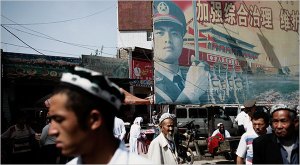It started in South Africa when, three years ago, China took banking and gold investments there worth a total of some £170 billion. The strategic importance of SA in terms of geopolitics and mineral wealth is obvious. And the Asian giant, no longer asleep, moved swiftly north and west from that bridgehead.
Last week, China bought in the region of £840 million worth of Spanish Government bonds. A fortnight earlier, it agreed to very favourable trade terms with Greece, and declared ‘every confidence’ in a Greek recovery. The view is gaining ground that Beijing believes the EU could fall apart in the next few years. The Mediterranean is also of vital naval and trade importance.
Today it announced Shandong Iron & Steel would invest $1.5bn in its African Minerals’ flagship project in Sierra Leone. The Chinese state-owned group would emerge with a stake of about 25% in the Tonkolili project – and crucially, access to iron ore at discounted prices. African iron ore mining projects are finding Chinese backers because steeply rising prices have given impetus to Beijing’s desire to escape from reliance on other people’s raw materials.
China has become, in essence, a cash-rich investor in a recession-wracked region. It is buying up recent and historical failure on the cheap. And it is going to sweat those assets to turn them into huge income and power-play sources.
In Africa and southern Europe, China is quite simple establishing an empire whose dual purpose will be to give it an excuse for military presence, and access to the minerals and fossil fuels vital if growth is to be sustained.
But a relatively short distance from Greece lies increasingly Islamist AK-ruled Turkey, and the Middle Eastern oil supplies of the solidly Islamic Arabs. Not too far north and east of West Africa is Islam’s heartland. In West Africa and East Africa now, new Islamist terrorism groups are emerging almost every month.
Somewhere, senior Islamists must be watching the Chinese encroachment. They are more paranoid than Europeans, and they have more time to think and plot. Even more certain is that Chinese officials are expecting to have their own troubles with militant Islam from now on.
Islam was introduced into China during the Tang Dynasty of 618-907, following which Muslims introduced several strains of what we need regard as Chinese culture: noodles, deep fried foods, and even blue and white porcelain. But its influence there now is minimal, and in 2008 during the Olympics in Beijing, China’s own problems with Islamic fundamentalism were revealed.
Chinese police were ambushed in Kashgar following threats to do exactly that during preceding months. Kashgar is in Xinjiang province, the heartland of the eight million Uighur people, a Muslim group with far more in common with the their ethnic cousins to the West than with mainstream Han Chinese culture.
Residents tell foreign visitors of their unhappiness with rule from Beijing...and most of these involve the strident demands we’ve come to expect in the West: at their peak, a series of protests, riots and bombings claimed by militant Islamists in the 1990s led to vicious Communist repression for some time. In 2008, a “Commander Seyfullah” of the so-called Turkestan Islamic Party – believed to be an ETIM offshoot – again threatened attacks on the Olympics.
So the Chinese know what they’re dealing with. It will be, to say the least, an interesting confrontation when (not if) it occurs. And it may form an unexpected dimension of help for a West struggling to contain the threat of Muslim fundamentalism.





